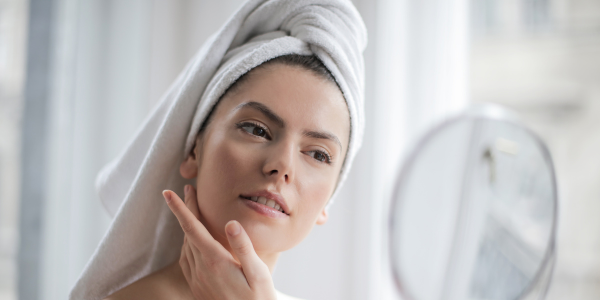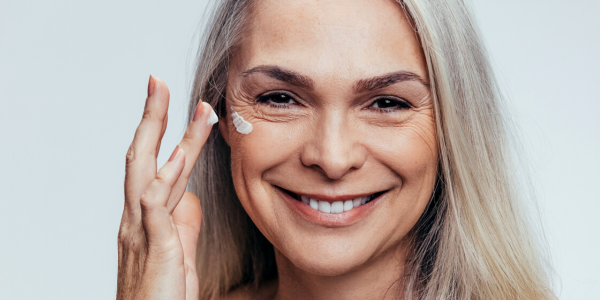
Tretinoin Vs. Retinol: Which is Better?

Tretinoin and Retinol are retinoids that derive from Vitamin A.
Retinoids have proven success in boosting cell turnover, encouraging collagen production, and reducing the signs of aging.
Retinol is a widely known anti-aging ingredient added to many face creams. Retinol is available over the counter and does not require a prescription.
Tretinoin is a prescription-strength retinoid. It has similar effects to retinol but is much stronger. It’s prescribed for anti-aging as well as other skin issues like acne.
We’ll go over the pros and cons of both and how they compare to each other.
What do Retinoids Do?
To understand the benefits and drawbacks of Tretinoin vs. Retinol, it’s important to know how retinoids impact the skin.
Retinoids can:
- Improve skin elasticity
- Hydrate the skin
- Reduce fine lines and wrinkles
- Ease hyperpigmentation
- Smooth rough, uneven skin
- Address acne
The benefits of retinoids come from a few different methods of action.
Retinoids increase the skin’s collagen production.
Collagen is responsible for skin elasticity and keeping the skin smooth, soft, and firm. Collagen also helps the skin maintain moisture.
As we age, our collagen production decreases, which often leads to dull, dry, and sagging skin.
Retinoids can improve collagen production to give the skin a more vibrant, youthful glow.
Retinoids speed up the turnover of skin cells.
Aging impacts the skin’s ability to turn over new cells, which contributes to the dull look of aging skin, as well as fine lines and wrinkles.
By increasing cell turnover, retinol helps your body produce new, smoother skin.
Because of its effects on skin cell turnover, retinoids can also help smooth acne and acne scarring, reduce hyperpigmentation, and ease rough patches. It does this by encouraging new cell growth, clearing the pores, and slowing the production of sebum (face oil).
Tretinoin Vs. Retinol: Strength
According to research, Tretinoin is around 20 times stronger than Retinol.
That’s why Retinol is available in many commercial face products, while Tretinoin is only available via prescription from a medical provider.
Tretinoin may suit your skin better if you are experiencing advanced signs of aging.
It may also work better for you if you have significant acne and acne scarring, since it is also prescribed to treat acne.
If you experience significant hyperpigmentation, Tretinoin could work best for you, as well.
On the other hand, Retinol may work better for you if you are under the age of forty and require gentler anti-aging effects.
Retinol is also better for sensitive skin, since Tretinoin can cause more irritation due to its strength.
Winner: Tretinoin, unless you have sensitive skin.
Tretinoin Vs. Retinol: Anti-Aging Benefits
As we’ve discussed, Tretinoin is more potent than Retinol. Because of this, it offers more comprehensive anti-aging benefits.
Tretinoin is often more effective with severe signs of aging like deep-set wrinkles and areas of pigmentation (age spots). It may work better for older patients, especially those who have experienced menopause or andropause.
Both Tretinoin and Retinol take time to show effects, however.
Tretinoin takes around six weeks to begin improving the skin’s appearance, although some users see improvement in as little as two to three weeks.
Retinol takes around twelve weeks to start showing its positive effects on the skin.
Both Retinol and Tretinoin show even better effects over time. Users often see the most improvement within six months to a year of regular use.
While Tretinoin typically works faster than Retinol, it can also lead to more severe side effects in the beginning. Redness and peeling may impact the skin’s appearance and hide the positive benefits at first.
Winner: Tretinoin, although it may cause more side effects in the short term.
Tretinoin Vs. Retinol: Acne Treatment
If you’re seeking an effective acne treatment, retinoids are a great place to start. Because they boost cell turnover, they can clear pores and ease the appearance of acne and acne scarring.
Tretinoin is FDA-approved for the treatment of acne. It’s best for those with severe acne for whom over-the-counter products don’t work.
Tretinoin may cause “skin purging.” As the skin adjusts to the medication, it may become more inflamed and peel more severely.
The skin’s appearance is typically worse during this time. This cleansing period typically lasts around four to six weeks, and then acne and breakouts gradually begin improving.
Retinol can cause a similar purge, although it may be milder since the medication isn’t as strong as Tretinoin.
To reduce side effects of this “purging” phase, users can try strategies like:
- Using a quality moisturizer on the skin.
- Using a high SPF sunscreen to protect the skin from UV rays.
- Avoiding irritating products that include acid or alcohol.
Tretinoin usually works more quickly than Retinol and treats acne scarring and severe acne better. But if you have less severe acne, you may prefer a gentler Retinol formula.
Winner: Tretinoin for severe acne and acne scarring; Retinol for minor acne concerns.
Tretinoin Vs. Retinol: Side Effects
Because they’re both retinoids, Tretinoin and Retinol have similar side effects. These include:
- Skin irritation and dryness. Retinoids are well-known to cause skin irritation, especially if you haven’t used them before. Your skin may flake as it adjusts to increased cell turnover.
- Hyperpigmentation. Although retinoids often help with hyperpigmentation, they may also cause it. This is especially true if you have a darker skin tone.
- Sensitivity to the sun. Retinoids increase the likelihood of sun damage, because new cells are being pushed forward and exposed to UV rays. Since UV exposure is a main cause of aging, photosensitivity is something to consider if you spend a lot of time outdoors.
- Not suitable for pregnant women. Vitamin A, from which retinoids are derived, can lead to birth defects in fetuses. It is not recommended to use any retinoids during pregnancy and breastfeeding.
While the side effects are similar, Tretinoin is more likely to cause significant side effects since it is much stronger than Retinol.
For both retinoids, a patch test in recommended. Apply your formula on a small area of skin to check for side effects before applying it to your whole face.
Winner: Retinol, because it’s lower strength and causes milder side effects.
Tretinoin Vs. Retinol: Access
Tretinoin is a prescription medication. You’ll need to connect with a medical provider to be prescribed Tretinoin for anti-aging and/or acne.
Defy Medical offers access to three forms of Tretinoin cream:
- TAN Sensitive Cream (0.015%) – If you have delicate skin, the TAN Sensitive Cream is a good place to start. This is especially true if you’ve used Retinol and had a strong reaction to it. It’s also best to start with a TAN Sensitive if you haven’t used Tretinoin before.
- TAN Mild Cream (0.03%) – The Mild Cream is a step up in strength from the Sensitive Cream. It’s a good midway point if you need a stronger dose but don’t want to jump to the maximum strength cream.
- TAN Strong Cream (0.045%) – As the name implies, this is the strongest form of Tretinoin cream that Defy Medical offers. We recommend this formula for experienced retinoid users, and for patients with severe acne and/or severe signs of aging.
Retinol is readily available in many over-the-counter beauty products. However, some formulas add ingredients that impact Retinol’s effects, or include Retinol is such small amounts that the benefit is minimal.
When choosing a Retinol product, look for a percentage between 0.3% and 1%, and avoid products that mix Vitamin C, Benzoyl Peroxide, glycolic acid, or salicylic acid with Retinol.
Unless you have very sensitive skin, you should also avoid formulas that include “pro-retinols” or “retinyl propionate,” since these are less effective forms of Retinol.
Winner: Retinol is more widely available, but choose your formula wisely. Or work with Defy Medical to access a Tretinoin prescription online (as appropriate).

Tretinoin Vs. Retinol: Which One is Better?
Both retinoids have benefits, and the right one for you will depend on your skin sensitivity, unique needs, and the goals you’re hoping to achieve. This article should help you make a decision based on your individual situation.
If a stronger skin treatment is right for you, Defy Medical offers access to prescription Tretinoin creams at different strengths (as appropriate for the patient). You can access our care via telemedicine and order Tretinoin easily through our patient portal.
Ready to learn more?
Get Started

